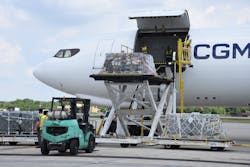Make Air Cargo a Priority for Smaller Regional Airports
Between an e-commerce boom, supply chain shortages, and intense consumer demand, there’s little doubt: It’s a new era for the cargo freight industry.
During 2020, consumers became accustomed to – even thrived on – online shopping. Retailers big and small responded by pivoting their attention toward e-commerce. And with little evidence that those trends will ever shift back to the way they were before, the freight marketplace is ripe with opportunity.
Chicago Rockford International Airport (RFD) is an ideal location for packages to arrive in the Midwest before being dispersed throughout North America.
To that end, RFD handles up to 40 UPS flights daily on average and is one of Amazon’s five busiest air hubs. It didn’t come to fruition by happenstance, but through careful vision-casting and infrastructure investment.
Seizing the Day as a Small Airport
RFD is far from a newcomer in the cargo market. Air freight has been a core component of the airport’s strategic growth plan for decades, as it maximized its opportunities as a regional airport on the outskirts of a major metropolitan area.
RFD’s cargo footprint began even before e-commerce did. Its first major deal happened in the early 1990s, when UPS struck a deal with Wisconsin-based Lands’ End. UPS saw the marriage of many factors here: easy interstate access, a central location, inexpensive land for development, and the ability to get wheels up quickly at all times of the day or night.
The shipping carrier found that moving freight in and out of RFD was hassle-free and fast. So, RFD’s relationship with UPS grew over the years, with the airport eventually becoming the second-largest UPS hub in all of North America.
With e-commerce growing over the past decade, leaders at RFD knew the time was right for strategic investment in the cargo side of their business. The RFD team approved a $17 million ramp expansion, an Amazon facility expansion, and a new $50 million International Cargo Facility.
The airport was among the first in the country to establish itself as an Amazon Air gateway, when Amazon first launched its own cargo freight flights in 2016. This investment along with investments made for UPS as well as international cargo flights contributed to RFD being named by Airports Council International as the fastest-growing cargo airport in the world among those handling at least 250,000 metric tons of freight each year.
Business continued to grow by the time the calendar changed to 2020. RFD executives were pushing hard for new opportunities, particularly in the international market and in just the first quarter of 2020, RFD saw a 30 percent increase in landed weight from the previous year.
Taking Advantage of a Regional Airport’s Assets
At RFD, carriers experience the same access to the Chicago metropolitan area – but with far less congestion. One of the world’s busiest airports is less than 70 miles away, but its vectored approaches, long taxi times, and considerable ground holding result in slower cargo recovery speeds.
Simply put, RFD’s size and location allow cargo to be moved more efficiently.
RFD’s wait time is lower for both airplanes and trucks, keeping cargo moving into the hands of businesses and consumers far more quickly. It also is just minutes away from multiple state and federal highways, allowing cargo to be on its way to locations throughout North America.
But it’s not just location setting the stage for success in Rockford. Airfreight operations take up a large footprint of the real estate for an airport – real estate that’s already limited at land-locked, metropolitan airports. RFD has ample room to grow in a way that can accommodate warehousing, storage, and trucking needs for years to come.
RFD has completed a 90,000-square-foot facility as part of the International Cargo Facility to meet the needs of freight forwarders and air cargo airlines. Additional plans are in the works, as well, to support future growth.
That’s because international freight is the fastest-growing sector at RFD, consisting of up to 20 percent of its total cargo business. At present, RFD handles freight levels that are comparable to what it was like during the holiday seasons in years’ past.
As all businesses know, success comes from more than brick and mortar. It’s about people. While employers nationwide are experiencing staffing challenges, RFD has a long history of supporting training for both cargo handlers and aviation mechanics – key components to cargo freight success. Another major factor comes from the expertise that RFD has poured into its local supply chain. RFD leaders have never wanted the airport to simply be a place where carriers do business and then go on their way. Airport officials are invested in their carriers’ success. They do more than simply provide a runway for aircraft to land and take off.
Rather, RFD offers expertise in helping freight airlines and forwarders move their product efficiently on the ground. Officials coordinate trucking, warehousing, and material handling as integral parts of the supply chain. Airport leaders have long made a point of anticipating market shifts to stay a step ahead of its customers’ needs.
With its intentional blend of cargo air freight and passenger service, RFD offers a case study for other regional airports in the benefits of diversification. The two different service lines help it withstand economic swings and even prosper where others struggle.
Successful cargo operations rely on long-term vision casting. It’s about looking beyond the next 12 months at a longer term, bigger picture. Opportunities abound for regional airports, particularly those near major metro areas, to excel in the air cargo and logistics arena.
All it takes is solid infrastructure, the right location, and a whole lot of sweat equity.
As Executive Director for the Chicago Rockford International Airport (RFD), Mike Dunn is responsible for securing opportunities for the growth of the airport through additional cargo and passenger business as well as work with government officials to secure grants and additional support and advocacy.
Dunn was named to his role in 2012 and since that time, RFD has become the biggest economic engine in the region and was recently ranked by the FAA as the 17th largest cargo airport in the U.S. Previous to his role as ED, Dunn was on the Airport’s board of directors where he was a tireless advocate for the organization’s growth and enhancement.
About the Author

Mike Dunn
Executive Director
As Executive Director for the Chicago Rockford International Airport (RFD), Mike Dunn is responsible for securing opportunities for the growth of the airport through additional cargo and passenger business as well as work with government officials to secure grants and additional support and advocacy.
Dunn was named to his role in 2012 and since that time, RFD has become the biggest economic engine in the region and was recently ranked by the FAA as the 17th largest cargo airport in the U.S. Previous to his role as ED, Dunn was on the Airport’s board of directors where he was a tireless advocate for the organization’s growth and enhancement.